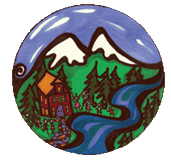A letter to parents from a parent & staff member
Hello Everyone!
Happy Spring! How are you doing? The children are embracing the warm weather and the mud-season it’s brought with it. I can’t believe we are already watching tiny seeds sprout and grow in our classrooms so we can plant them in Sam’s Community Gardens. As we look ahead, I wanted to take the time to share with you a bit of my journey here, all that I have learned, and some tips for parents to get the most they can out of the wonderful resources they have at their fingertips.
This is my third year as a parent at MMCH and my first year as a staff member. In my first few years of parenting Silas, I read several books and blogs to educate myself to be the best mother I could be. I thought I learned so much (and I did) but it is nothing compared to the knowledge I have gained working in this wonderful Montessori school. Misse, Bethany, Dani, and Jess are a wealth of knowledge. Their experience combined has made me a better teacher and parent in so many ways. I will do my best to give you some insight as to what I have learned within the Montessori teaching philosophy and ways to apply it to your life at home.
When I joined the staff in the fall of 2020, I was familiar with the Montessori philosophy. Silas had spent the last two years at MMCH. I had read the Montessori Toddler book by Simone Davies. I had pinned lots of Montessori actives on Pinterest (which I have since learned are not true Montessori). I have tried to purchase materials for our home that I thought fit perfectly within the philosophy, only to find out that the activity board I bought was too busy and my child had no interest in it. Let’s just say, I have learned how little I really understood…
One of the greatest take-aways from my experience as a staff member at MMCH is that these teachers are a resource for us. They are not solely here to teach our children, but they have so much to teach us. The staff has SO many tips and tricks that may or may not work for your family, but they have endless tools to offer you as a way to help you navigate parenthood. They spend lots of time observing and interacting with our children in a way that we often do not get to see as a parent. They see their social interactions, personal interests, and academic world in a safe, organized, intentional environment. They know how to comfort our children, and how to motivate them. They know the foods they like, the things that bring them joy, and the stuff that makes them sad. These women are incredibly compassionate, understanding, and nonjudgmental. They pay attention and are trained to notice the nuances of their behavior. The staff WANT to help in any way they can. If you have a struggle, a question, a concern, ASK!
The next lesson I have learned is the importance of language. How we communicate with our children has a great impact on their response, behavior, and interactions with us and others. When I first started one of my greatest challenges with the toddlers was that they all want the same thing at the same time. Parents of multiple children, I am sure you can relate to this. Misse taught me to say “First.., and then….” For example, two students want to slide at the same time. “First Luna will go, and then Silas will have a turn.” This almost always works.
This next tip sounds so obvious but it wasn’t to me. Children want their feelings to be validated. Recognizing and acknowledging a child’s feelings makes a significant impact on their emotional well being. If a child is having a moment, where they are really sad or angry or are upset about something, simply acknowledge it. For example, Silas was really upset that his sister broke a toy he didn’t pick up. Instead of telling him he should have picked up his things, I simply looked into his eyes and said “I see that you are very upset. I am so sorry that your sister broke your toy.” There was a natural consequence of not picking up his toys. He felt that and I didn’t need to address it. Recognizing his feelings and validating his feelings changed everything. I could see his entire body language change. He calmed down and was able to calmly move forward.
Another tip that seems so obvious now, but previously was not is that children want to know what’s going on and they understand so much more than we realize, ESPECIALLY the toddlers. I can’t tell you how many times I have heard people say “wow! It’s almost like she understands what you’re saying.” This is because she does. Children are sponges, as I’m sure you are aware. Sometimes we do things and think that our children don’t have the ability to process what is going on, when in reality they do. Honest communication with your children will go a long way.
To sum it up, MMCH is a very special place and I am more than ever grateful for this environment for my children. I never knew Sam, but I feel her intentions here every single day. I will cherish the years my children get to learn and grow at Maine Mountain Children’s House. I hope you find this helpful. It’s been challenging for me to consolidate all that I have learned. These are the greatest takeaways that have made a significant impact on my family’s life and are some of the many reasons why I choose to enroll my children at MMCH.
With lots of love,
Kristie (Silas & Luna’s Mom/Toddler Teacher) :)

